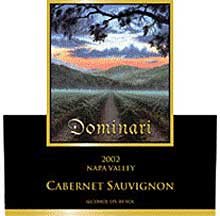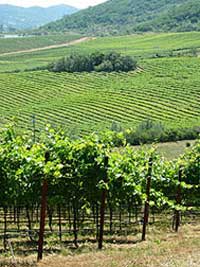

Dominari is the domain of winemaker Marie Schutz who uses mainly fruit from her beloved Atlas Peak vineyards.
Atlas Peak ~ Napa Valley (AVA)
Little Dominari About To Grow
We have very big mountain fruit that I don’t think needs a lot of chemical additions or changes. In modern winemaking there’s so much you can do to change the perception. With Atlas Peak fruit, whatever comes off the vine is pretty much how we bottle it. I think winemaking is done in the vineyards.
~Marie Schutz
by
Alan Goldfarb
March 7, 2007
MARIE SCHUTZ (MS): When things get over my head, I call on John. When I need a reference, I always like to have a second opinion.
AG: What would be some of those things?
MS: Sensory perception – the nose and the mouthfeel. If there was something off on the wine that I couldn’t perceive, or on a wine that stumped me, I would always call someone.
AG: John McKay is a proponent of micro-oxygenation. Is he doing that to your wine?
MS: No. I don’t even know what that is.
AG: Micro-ox is a process where small, measured doses of oxygen are let into a stainless steel tank so that the fermenting juice -- with the addition of oak staves or other wood products –might be improved; and be ready for market quicker than by using actual barrels. At least that’s what is claimed by its proponents.
MS: I’m an old fashioned winemaker. I don’t like to use chemicals or anything else in my wine. In my winemaking, I don’t know if I want to play around with my Atlas Peak fruit; same thing with my new French oak. And, we don’t age our wine in stainless steel tanks for starters.
AG: What do you mean by “old fashioned winemaker”?
MS: I like the Bordeaux style, typically using half new and half used barrels, racking (removing clear wine from the sediment) four times, and two years of fermentation (in barrels).

Atlas Peak vineyard at 1700 feet which is about half way up the mountain.
AG: A lot of winemakers say that, but their philosophy in some cases is something else.
MS: Some people feel they can take any fruit … and change the character of the wine.
AG: Why do they do that?
MS: To make a better product. Not everyone can have mountain fruit or make big wines. You have to work with what you’re given.
AG: I know of some winemakers who even manipulate mountain fruit.
MS: I’m not saying there’s anything bad with making a perfect product.
AG: So, you’re not an adherent of the new winemaking techniques?
MS: Not today’s winemaking, no.
AG: Do you get pressure from your colleagues to utilize some of those methods?
MS: There’s nothing wrong with using those additions to make a better product. Everyone has a different style.
AG: Can you define the terroir of your vineyard? In the two wines of yours which I’ve tasted – the Cabernet Sauvignon and Merlot – there are aromas of tar and minerality on the front of the palate. Does that come with your terroir and your philosophy of winemaking?
MS: Tar and minerality aren’t very complimentary comments … But I think wines are made in the vineyard. There’s more of a rounded mouthfeel and chocolate, more than tar. We have a very mountainous region that has clay loam soils with pumice, which produces a very earthy grape. When I say earthy, I would mean something that is deep in flavor.
AG: That’s what I mean by tar and minerality. I think those are earthy qualities and I think it comes from the soil, the terroir. Tell me about your site
MS: The vineyard faces east surrounded by a group of mountains which creates a micro-climate that has warm air on summer nights. I think it’s the warmest spot on Atlas Peak. It allows the grapes to mature earlier than most. We’re normally one of the first to pick on the mountain.
There are very few rocks, unlike most of the other volcanic rock on Atlas Peak. Although some will argue that rocky soils lead to better, more intense flavors; it’s easier to grow on the vines (on clay soils) than rocky soils. We still have those intense flavors because we’re mountain fruit. But it’s different.
AG: Why are you looking for a new site on the valley floor? Aren’t you a proponent of Atlas Peak?
MS: I’m absolutely a proponent. I love the fruit there. I don’t think I could ever replace the fruit on that property. But we’ve outgrown our south Napa winery and I need to be on the valley floor because my son goes to school there.
AG: Will you continue to grow grapes on Atlas Peak?
MS: Absolutely!
~ Alan Goldfarb, Regional Correspondent










 READER FEEDBACK: To post your comments on this story,
READER FEEDBACK: To post your comments on this story,





